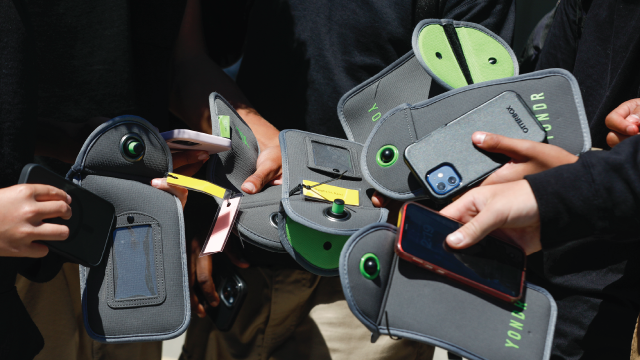
While lawmakers and educators are banning cell phone use in schools, many Americans support cell phone use in classrooms but disagree with day-to-day bans.
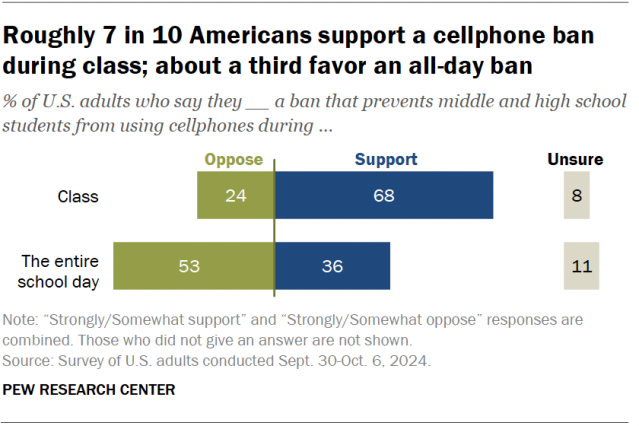
Everything68% of US adults say they support banning middle and high school students from using cell phones in the classroom, According to a Pew Research Center survey conducted on Sept. 30-Oct. 6, 2024. This includes 45% who support this.
Another 24% disagree, while 8% say they are not sure.
The Pew Research Center conducted the survey to understand how Americans ban cell phones from middle and high school students.
For this analysis, we surveyed 5,110 adults from Sept. 30 to Oct. 6, 2024. Each participant in this study is a member of the Center’s American Trends Panel (ATP), an international, randomly selected group of individuals. residential addresses that have consented to frequent searches. This type of registration gives almost all US adults a choice. Surveys were conducted online or over the phone with an interviewer. The survey is expected to be representative of the US adult population in terms of gender, race, ethnicity, social class, education and other factors. Read more about the ATP process.
Here are the questions used in this review, the top line and the research method.
Some school districts have called for cell phone bans entirely, not just in the classroom. Our research has found that people are less supportive of banning cell phone use throughout the day than banning it in the classroom.
About one-third (36%) support banning middle and high school students from using cell phones during class throughout the school day, including during lunch and between classes. By comparison, 53% oppose this more restrictive approach.
Jump to read more about why Americans help or opposition ban class calls.
Views by age
Teens are less likely than older groups to support cell phone bans in middle or high school, in the classroom or throughout the school day.
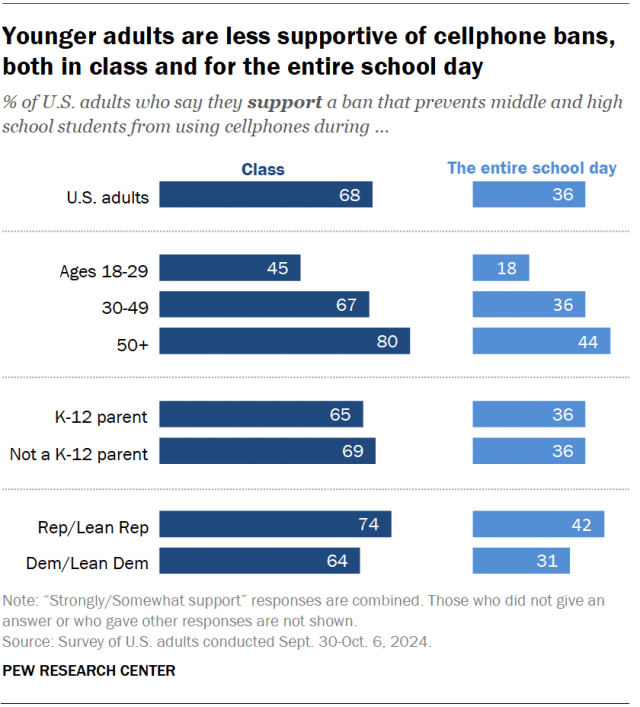
Less than half of adults under the age of 30 (45%) say they support banning students from using cell phones in the classroom. This share rises to 67% in those aged 30 to 49 and 80% in those aged 50 and over.
There are similar age differences in views of banning cell phones during the day. Only 18% of adults under the age of 30 support banning students from using phones throughout the day. In comparison, 36% of those aged 30 to 49 and 44% of those aged 50 and over favor this type of restriction.
Thoughts if someone is a K-12 parent
While some media headlines talk about parents’ resistance to banning cell phones, our research shows little difference between those who have school children and those who don’t.
For example, 65% of parents with K-12 children support banning students from using their phones in the classroom. This compares to 69% of those without children in these classes. And equal shares (36% each) support a full school day ban.
The view is a party
Most Republicans and Democrats — including independents who lean toward either party — favor banning students from using cellphones in the classroom. However, support is higher among Republicans than among Democrats (74% vs. 64%).
A similar process exists for viewing restrictions that occur throughout the school day. While 42% of Republicans back day-time restrictions, 31% of Democrats do.
Why Americans support cell phone bans in the classroom
We also asked people about the reasons they support or oppose cell phone bans.
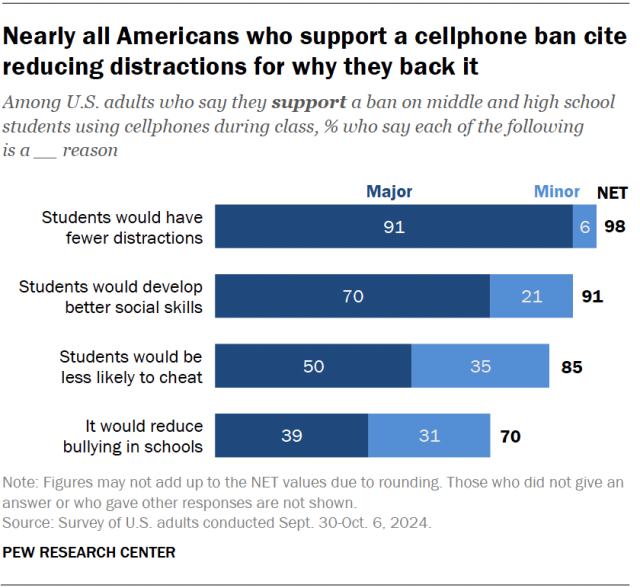
Of those who support classroom bans, nearly all (98%) state the reason they return because students would have fewer distractions in class. This includes 91% who claim to be a big because. Previous research shows that the majority of US high school teachers say cell phone distraction is a major problem in their classrooms.
Many contributors also point to other reasons we have asked. But few describe anything as a big because. Among those who support the ban:
- 70% say the main reason is that students can have good social skills.
- 50% say the main reason is that students are not good at cheating.
- 39% say the main reason is to reduce bullying at school.
There is little difference by age and political party in the percentages of people who cite each of these as major reasons.
Thoughts if someone is a K-12 parent
The only reason parents of K-12 students differ from non-K-12 parents is bullying. Among those in favor of cell phone bans, 44% of K-12 parents say the main reason they favor it is to reduce bullying in schools, compared to 37% of non-K-12 parents.
Why Americans oppose cell phone bans in the classroom
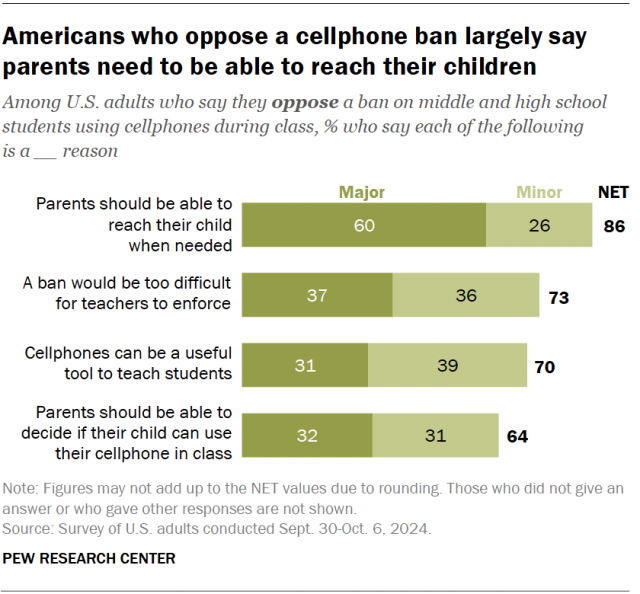
Among those who oppose the ban, most cite any of the four reasons we asked. Six out of ten – the largest proportion of any reason we’ve asked – say a big because he opposes the ban and reason parents should be able to reach their child when needed. Another 26 percent say this is a minor reason they oppose banning phones in the classroom.
Looking at the other three reasons we asked:
- 37% say the main reason is that it can be difficult for teachers to enforce.
- 32% say the main reason is that parents have to decide if their child can use the phone in class.
- 31% say the main reason is that smartphones can be a useful tool for teaching.
Thoughts if someone is a K-12 parent
Parents of K-12 students often emphasize the parent’s ability to reach their child. Among opponents of the ban, a majority of K-12 parents (70%) say this is the main reason. This share drops to 57% among non-K-12 parents.
K-12 parents are also more likely than their peers to say that the main reason they oppose banning cell phones is that parents make the decision (41% vs. 30%).
Views by age
Among those who oppose the ban, older Americans are Less perhaps more than young adults to name the three reasons we asked:
- 45% of people aged 50 and over say the main reason is for parents to be able to reach their child. This compares to 68% of 18 to 29 year olds and 63% of 30 to 49 year olds.
- 26 per cent of people aged 50 and over say the main reason is that parents have to make decisions, compared to 35 per cent of those under 30 and 30 to 49.
- 24% of those aged 50 and over say the main reason is that smartphones can be a useful tool for teaching, compared to 35% of those aged 18 to 29 and 34% of those aged 30 to 49.
The view is a party
Democrats are more likely than Republicans to cite parental access to their child as a major reason for opposing the ban. Among those opposed to the ban, 65% of Democrats say this, compared to 52% of Republicans. Democratic leaders are also more likely to cite cell phones as a useful educational tool as a major reason (35% versus 27%).
Note: Here are the questions used in this review, the top line and the search method.
#Americans #support #banning #cell #phones #classroom #support #allday #bans